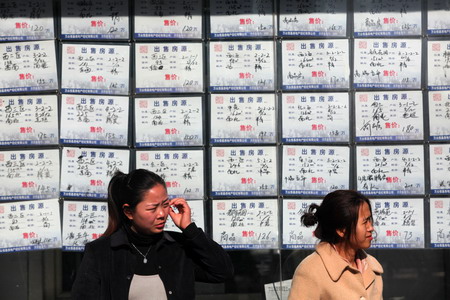Top Biz News
Rules to cool real estate market in Beijing
By Shen Jingting (China Daily)
Updated: 2010-02-01 08:17
 |
Large Medium Small |
|
 |
|
Few people are able to afford a visit to housing agencies as the city's property prices continue to soar. [China Daily] |
Beijing mulls over regulations to curb investment on property amid soaring prices
Beijing is set to launch specific regulations on the real estate sector just days before Spring Festival, aimed at curbing investment-led demand in the housing market and addressing imbalance between property demand and supply.
Xu Zhijun, a spokesman from the Beijing municipal commission of housing and urban-rural development, said on Friday that the government wanted to provide more subsidized housing, end some housing loan and tax preferences and crack down on illegal behavior by property dealers.
He said specific rules had already been drawn up. In addition to contributions from the municipal commission of housing and urban-rural development, relevant government departments, such as the local taxation bureau and finance bureau, would release their plans no later than Feb 14 - the day of the festival.
The move came after Beijing's property price skyrocketed in the second half of 2009.
According to statistics from the Beijing statistical bureau, residential complexes inside the Fourth Ring Road were sold at an average price of 25,907 yuan ($3,794.79) per sq m in the fourth quarter last year, up 2,334 yuan per sq m from the third quarter.
"I want to make it clear - Beijing is determined to curb the price hike," Chen Gang, vice-mayor of Beijing, said during the annual local legislative meeting. "I believe Beijing's property price will not experience wide fluctuation this year."
The government plans to allocate over 50 percent of new land to build low-cost apartments for the mass middle-income earners this year. More than 134,000 subsidized apartments will be built.
It also plans to invest 100 billion yuan, or almost 10 percent of Beijing's GDP in 2009, in land development to stabilize the real estate market.
| ||||
Shang Tao, marketing manager at Centaline China's Beijing office, a leading property agency in Beijing, said their staff had been busy taking clients to view second-hand houses two months ago. "But now, few people are interested in seeing houses. Even if we call and invite them, they are reluctant to take a look," Shang said.
"Last November, my uncle sold his apartment in only two weeks. But I haven't found a single person who wants my house after over nine days," Wang Guan, a Beijing white-collar worker, said yesterday. "Even though the location is better."
According to statistics monitored by a Beijing property trade management website, from Jan 1-27, the trade volume of Beijing's second-hand houses shrank to 12,237, a 70 percent drop from the same time the month before.













